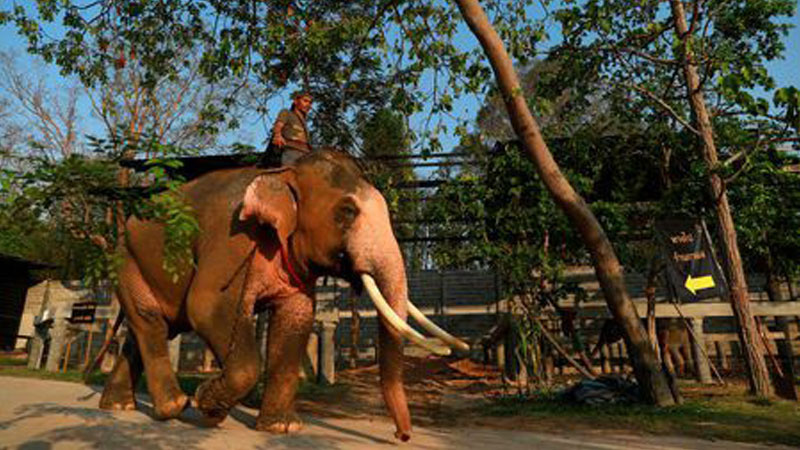 A large portrait of Thailand’s King Maha Vajiralongkorn dominates one end of the open-air enclosure where an elephant known as Plai Ekachai starts his day at a conservation centre in the country’s northeast.
A large portrait of Thailand’s King Maha Vajiralongkorn dominates one end of the open-air enclosure where an elephant known as Plai Ekachai starts his day at a conservation centre in the country’s northeast.
Since last year, the 33-year-old male elephant has been treated with reverence as a deity after being identified as the first auspicious white elephant to be discovered under the reign of King Rama X, as the monarch is also known.
The elephant is to be presented as a gift to the new king sometime after this weekend’s coronation ceremonies, the first the country will have seen in 69 years.
“There is no greater merit than to raise such an elephant for the king,” says Thanabadee Promsook, 35, who runs the centre housing nine other regular elephants.
Thanabadee refers to the elephant as “His Highness” and kneels before him daily. “Plai” in Thai means male elephant.
Elephants classified as white in Thailand are not necessarily albino or solid white but are more pale in colour than normal and are rare and especially revered.
They are regarded as a symbol of kingship and treated as deities, mainly due to the mythical white elephant Airavata, or Erawan as Thais call him, who is the vehicle of Indra, king of the Hindu gods.
Moral Strength
In Thai Buddhism, the appearance of white elephants is associated with the moral authority of a monarch, whose ability to attract such divine beings is one indication of his divine mandate, said Edoardo Siani, a cultural anthropologist of Thailand at Kyoto University.
“Buddhist kings show possession of white elephants as a proof of their legitimacy,” said Siani.
“Legitimate kings effortlessly attract white elephants from all corners of the kingdom. These elephants willingly submit to the authority of kings out of recognition of their moral strength.”
King Vajiralongkorn’s late father, King Bhumibol Adulyadej, received 10 white elephants during his 70-year reign, before he died in October 2016.
When his remains were kept at the Grand Palace awaiting a royal cremation, 11 elephants decorated to look like white elephants crouched down before the palace walls in a symbolic gesture to honour the “people’s king”.
Thanabadee said he was overcome with joy to present the new king with the first white elephant of his reign, especially in the auspicious light of the coronation events.
Although not an albino, Ekachai is white – an indication of purity in Thai tradition – in all the right places.
According to ancient Brahman texts, a white elephant has seven auspicious characteristics: white eyes, a white soft palate, white toenails, white hair, white skin, white tail hair, and white genitals.